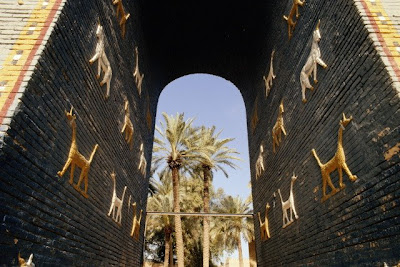Maqam Rast - Yusuf Omar يوسف عمر و الچالغي البغدادي
Yusuf Omar and al-Chalghi al-Baghdadi

- Tahrir, unmeasured vocal part sung to the word "yar" presenting the rast mode. (1:05)
- Instrumental part on the santur taking up again the tahrir melody. (2:11)
- A poem picking up the tahrir melody. (2:44)
- Improvised piece on the djoze in rast mode. (3:10)
- Improvised piece on the santur in rast mode. (4:14)
- "Mansuri" vocal piece (bayat and saba modes).
- "Ibrahimi" vocal piece (bayat mode).
- Jalsa, a cadenza called "Hijaz shaytani" bringing the first part to an end. It is characterised by a progressive descent towards C which is here extremely abbreviated.Second part includes three meyana ("middle part" sung in the higher register).
- First meyana, called "Seigah Balaban" (in seigah mode) then return to the rast degree.
- Short instrumental composition dulab in sharqi rast mode on a 4/4 wahda rhythmical formula.
- Second meyana, "Khalili" to the words "nazenine men" (in tchahargah mode). (0:38)
- A piece called "Sharqi Rast" sung to the words "ya lali, ya lali, ya ya ya dayim". (0:52)
- Second dulab in sharqi rast on a 6/4 sengin sama'i rhythm. (1:28)
- Third meyana, "Hijaz Madani" (in hijaz mode) to the words "yademen ya dust". (1:54).
- Vocal piece "Mathnawi" ( several verses in hijaz mode). (2:15)
- Musical section "Mathnawi" (in hijaz mode) (3:19)
- Teslim progressively descending from B flat to C passing through F and concluding the maqam. (4:40)
- Peste, "Marabit" in rast mode. This peste is an old traditional song with a 4/4 wahda rhythm. (5:07)
Abu-Haidar, Farida 1988 "The Poetic Content of the Iraqi Maqam." Journal of Arabic Literature 19(2):128-41.
Baram, Amatzia 1991 Culture, History and Ideology in the Formation of Ba'thist Iraq, 1968-89. New York: St. Martin's Press.
Hassan, Scheherazade Qassim
1987 "Le makam irakien: structures et realisations." In L'improvisation dans les musiques de tradition orale. Bernard Lortat-Jacob, et. Ethnomusicologie 4. Paris: SELAF, 143-9.
1989 "Some Islamic Non-Arabic Elements of Influence on the Repertory of al-maqam al-'iraqi in Baghdad." In Maqam-Raga-Zeilenmelodik. Konzeptionen und Prinzipien der Musikproduktion. Arbeitstagung der Study Group ,maqam. beim International Councilfor Traditional Music vom 28. Juni bis 2. Juli 1988 in Berlin. Berlin: n.p., 148-55.
Touma, Habib Hassan
1996 The Music of the Arabs. New expanded edition. Portland, Oregon: Amadeus Press. English translation of Die Musik der Araber. Taschenbucher zur Musikwissenschaft 37. Inter- nationales Institut fur Vergleichende Musikstudien. Wilhelmshaven: Florian Noetzel, 1989.
Warkov, Esther
1986 "Revitalization of Iraqi-Jewish Instrumental Traditions in Israel: The Persistent Centrality of an Outsider Tradition." Asian Music 17(2):9-31.
-Records-
- Arabian Music: Maqam. Recordings by Habib Hassan Touma, Radio Baghdad and Jacques Cloarec. Commentary by Habib Hassan Touma. UNESCO Collection Musical Sources. Modal Music and Improvisation VI, 3. Philips 6586 006. 1971.
- Iraq. Makamat par I'ensemble al tchalghi al baghdadi et Yusuf Omar (chant). Recordings and commentary by Scheherazade Qassim Hassan. OCORA OCR 79. Reedited in 1985 under the same title in the series Musiques traditionnelles vivantes. III. Musiques d'art (Musiques savantes) as OCORA 588.633. 1972.











اورع ما في العالم هو المقام العراقي والمحافظة عليه واجب مقدس على كل عراقي
ReplyDeleteThe Maqam should be valued and we Iraqi people should be very proud. When I hear Munir Bashir, Yusuf Omar etc It's like I fly to my Iraq. My love Iraq.
ReplyDeleteولد المقام من رحم عراقي ويبقى الى ابد الدهر قمة الغناء العراقي ويشكو قلة فاهميه ومقلديه نتطلع الى النهوض به لانه تراثنا الاصيل وحاضرنا المبهج ومستقبل اجيالنا
ReplyDeleteKeep on working, great job!
ReplyDelete